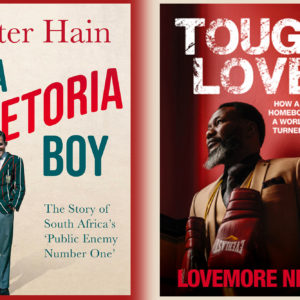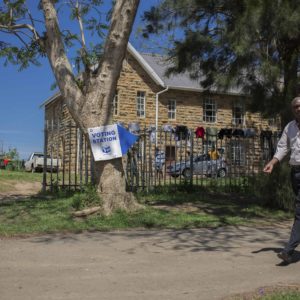A brother’s story of gender-based violence
Thato Molahlehi gives an insider account of how those around his sister turned a blind eye to her partner’s abuse, until the night she was murdered.
Author:
11 November 2021

I live in the eastern Free State QwaQwa village called Makgalaneng. It is on the border of Lesotho, the small mountain kingdom that historically resisted the advance of Boer colonisation and sought refuge as a “protectorate” of Britain. It is now independent and we speak the same language and regard each other as one people.
I would not say my village is developed. The QwaQwa ‘homeland’ in which Makgalaneng was nested was a small area where land was traditionally owned. But it was an apartheid creation ruled by collaborators, and a dumping ground for African people not wanted in the city. There was some investment in factories to show that this was the beginning of an ‘independent’ Black state.
Not much has changed since apartheid. After apartheid, incentives were withdrawn and the factories collapsed, the last one in 2010. A strip of dilapidated warehouses remains. Our group of villages is still one of the least developed areas in South Africa.
Related article:
As with many failing municipalities, there is maladministration and corruption. The Maluti-a-Phofung Local Municipality has been declared bankrupt and is under central government administration.
I got my university degree in 2016, but it did not result in a job. After years of frustration in the job search, I decided it was time to do something else and get a driver’s licence. That’s not easy; locally the slots for driving tests are fully booked. So, I went to Westonaria in the Vaal area, towards Joburg. Testing slots there are more easily available.
The day for my test came on Friday 17 September. I woke with the bright sun, with a mission. I took a taxi to the Westonaria licensing department and read in preparation for my learner’s exam.
A disturbing story
My cellphone rang and it was my sister Puleng Nkoko. At 54, she was 23 years older than me and it was a surprise as I was not on good terms with her. I did not want anything to disrupt my attention as I desperately wanted to pass this test, so I did not answer. But Puleng also had a mission.
A few seconds later, an SMS flashed: “Thato, can you please tell your girlfriend to come help us with peeling today afternoon, tomorrow I have stokvel.” I quickly responded: “I’m not home. I’m at Westonaria but I will tell her.” I called my girlfriend and gave her my sister’s number.
My girlfriend Katleho texted to say they were happily on their way to buy drinks for tomorrow’s event [on a Saturday], our stokvel. This is our savings scheme, with members brought together for a party and drinks.

On the morning of Saturday 18 September, I headed home. Katleho knocked on my door and greeted me with mixed emotions and a disturbing story.
“What is it, my love?” I asked. “Thato, your sister told us that Mbutana [The Boyfriend] had come to the place where she works drunk, shouted at her boss, asking why are they overworking her even on weekends while paying her peanuts. He shouted, ‘When are they finishing?’ He’s always furious with her and asks: ‘Are you really working or with your other boyfriends… I always have to ask [Puleng’s daughter] Kananelo to prove that she’s home.”
Katleho continued: “While we were getting the drinks, your sister told me so many things. Her man is overprotective and jealous of her ‘boyfriends’. To her, overprotectiveness and harassment seem normal, a sign of true love. He can turn up at your sister’s work unexpectedly, especially if she works later than usual.”
Buoyed up on love
On Friday, as Katleho, Puleng and a few neighbours prepared for stokvel, I heard that Mbutana was calling continuously and demanding to talk to Kananelo, to know if his girlfriend was at home and not with another man. All the signs were there but we chose to ignore them, because we all thought it was going to pass and that he would change.
Things looked good for the party. Around midday, my younger brothers and younger sister, along with Katleho’s younger sister and I, went to Puleng’s place in another village. Everyone was happy and welcoming, except my sister. Even though she was smiling all the time, she looked uncomfortable and even scared.
The party started to buzz, people were on their way to being or already drunk, the dance floor was filling up, women ululating, kids running up and down, and men busy drinking “one way” as we say. By 7pm it was getting dark and Mbutana arrived. He did not greet anyone and shouted to someone on the phone: “Come this side now, don’t let me come get you that side.”
Related article:
A few seconds later, my sister appeared from around the corner with a fake smile and the phone at her ear. She pretended everything was fine. She approached me with a R50 note in her hand and gently asked me to buy two Hansa beers for The Boyfriend. But at 8.30pm, as people went their way, The Boyfriend demanded to know why they were leaving so early as there could still be a good time, they should come to his place. He blamed Puleng: “You are leaving because of my wife.”
A mutual friend, Annah, introduced Puleng to Mbutana. Puleng said she had found genuine love, a dark, tall and charming guy as her boyfriend. Annah warned her about Mbutana’s habit of assaulting his ex-girlfriends, but buoyed up on love and obsession, Puleng thought Annah was jealous and being mean and dramatic. In a moment of weakness, she told Mbutana about Annah’s warning. Furious, The Boyfriend called Annah’s husband, telling them to stay out of his affairs or face the consequences.
Estranged siblings
None of this was known to me. I resented my sister because she neglected us from an early age. When my mother died in 2004, she was one of the few elders left in our family and I felt she could have done more for us. She promised to take care of us but was nowhere to be found when we went to bed with empty stomachs. We expected nothing from our father as he absconded when we were very young, and we haven’t heard from or seen him since.
Why should brother and sister be so estranged? Our tensions had their reasons. I went to study at the University of Johannesburg in 2009 and Puleng’s firstborn Mahlomola went to the University of the Witwatersrand to study law. I finished my first year, but he failed and stopped studying.
During the Easter holidays in 2010, I had a supplementary exam on quantitative methods and couldn’t make it home. I heard the news later. Mahlomola had gone out with his friends on an adventurous robbery. While running away from the scene of the crime, he fell down a hill, hit his head on a brick and died. Nobody was arrested for the robbery. The investigative officer said there was not enough evidence.
Related article:
Following the death of Mahlomola, Puleng turned cold towards us. Even when I got my diploma in 2012, which I upgraded to a degree in 2016 as I couldn’t get a job, she didn’t send a congratulatory message. Sometimes, families like you when they can benefit from you, but I was unfortunate in job hunting. Maybe she didn’t want to associate with us so she would not have to hear us asking for food, electricity or for every other thing.
She felt that the little she earned doing domestic work was just enough for her and her daughter Kananelo. We felt abandoned, hated and neglected. I felt it was my responsibility to maintain our dignity. Our suffering was just a phase of life. That’s why we stopped bothering her, and why I was surprised and shocked to get her call on 17 September.
Financial struggles
Before that day, I had not heard how ruthless, jealous and overprotective Mbutana was. I believed this man in his early 60s was gentle and a talented handyman. He had many talents and was a self-taught car mechanic. He was a non-smoker and loved Hansa Pilsener. Mbutana was an introvert. He was never open about his upbringing, but he was a proud Xhosa guy. He was charming.
He did things for my sister. He plastered the whole yard with blocks of concrete and cut gullies to direct storm water to the drain.
But there were allegations that he had an abusive history and that my sister knew about it.
When Covid-19 hit, Mbutana’s business slowed and with clients no longer bringing in their cars, this frustrated him deeply. He became insecure when he could not be financially supportive. Sometimes he would receive just R100.
On the morning of 19 September, after the party, our community gathered to clean up. Kananelo waited for her mom to come and give her some of the stokvel money. At around 10am, people started to get worried. Calls to Puleng and Mbutana went straight to voicemail.
Related article:
I didn’t want to do anything or go anywhere. I stayed at home until I received a call at 6pm from a friend that I must come to my sister’s place “right now”. I ran as quickly as I could from Makgalaneng to Mabolela village.
Kananelo went to check on them. The house was locked and the neighbours had not noticed anyone leave that morning. But they had heard voices and noises in the early hours of the morning.
Kananelo called Mbutana again. This time he answered, but made no sense. Annah took the phone. The Boyfriend said he was at his place and that Puleng had left early that morning and did not tell him where she was going. Annah told him she was calling the police. Mbutana allegedly pleaded with her not to, and quickly hung up.
Puleng was found naked, her face green and her neck bruised, lying in a pool of blood. Only then did people start talking.
The neighbours said they had heard a woman screaming and crying into the early hours of Sunday morning. They then heard no more.
A nasty dream
I know sometimes it’s better to mind your own business. But what’s your purpose as a neighbour if when I need you most, you are nowhere to be found? If you cannot interfere, how will there be justice? Gender-based violence has no place in our society and it’s our collective responsibility to prevent and end it.
The investigating officer told the family that this was a serious case because it included sexual assault. In our tradition, the body should be buried a week after the death. But because this was a special case, the funeral was planned for two weeks after.
The post-mortem found that Puleng had been sjambokked and strangled to death.
The news of her murder travelled far. Cattle traders from Lesotho, tough men used to a hard life, helped. In our culture, if it is not a natural death, we are not allowed to spill blood inside the yard; there can be no slaughter of an animal for the wake.
Related article:
The cattle traders from Lesotho visited our family and volunteered to slaughter the cow in their kraal. They washed it and delivered the meat to us for free. Obeying Covid regulations, we did not have a night vigil, but the yard was full of people who came to support our family.
It was like a nasty dream, or some movie scene. My close friend said: “I hope the police don’t catch the man so we can deal with him our way, with mob justice.” His deepest worry was if we had any policies, to give her a dignified funeral.
Those were the points of unity. Everyone came together. Everybody felt they could have done something earlier to stop it. We all felt we had failed Puleng, and we didn’t want another case of Puleng in our community. Surely enough is enough?
The rights instilled in men
How did Puleng endure such deadly abuse? Women find themselves in abusive relationships because our parents teach us that women must respect men, and it is men’s responsibility to take care of their women financially. Failure to do so carries shame and trauma.
Many men are labelled failures because of a system they cannot control. Mbutana’s insecurity could have come from his business failing and Puleng earning more than him, even at the low wage of a domestic worker. When they went to pick up my sister’s belongings at Mbutana’s house, they found his state pension card.
Related article:
We are living in a society where boy children think they own women as their property, just because of their financial status. A woman doesn’t have the right to say no because I feed her, buy her clothes and give her money. I have the right to do anything with her body any time I want to. If you have money, some parents want you to marry their daughters, not thinking about how you feel about each other but for the financial benefits.
There was inequality even in the ceremonies of death. At my sister’s funeral, the local guys who worked the yard the whole week, slaughtered animals and prepared the graves were given umqombothi (traditional beer) and bones after the funeral. Those who had money, who only arrived on Saturday in their shiny suits, were given a first-class reception with a cold drink and the best meal. That is the way things are.
Elias Mbutana Noka was released on bail of R1 500 on 10 November. His next court appearance is on 12 January.





